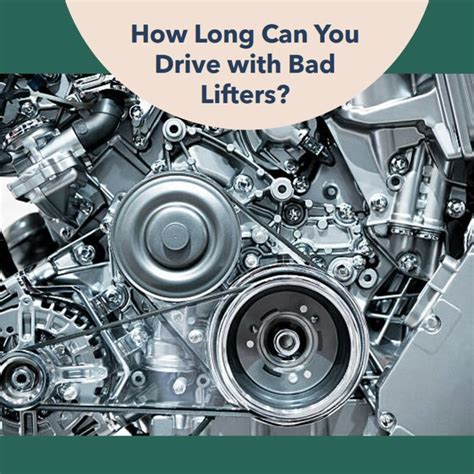How Long Can You Drive With A Bad Lifter
Ronan Farrow
Apr 05, 2025 · 3 min read

Table of Contents
How Long Can You Drive with a Bad Lifter?
Driving with a bad lifter is a risky gamble. While you might be able to get away with it for a short time, continuing to drive with a faulty lifter can lead to significant and costly engine damage. This article will explore how long you can potentially drive with a bad lifter, the signs to watch out for, and what you should do if you suspect a problem.
Understanding Hydraulic Lifters
Hydraulic lifters are crucial components in your engine. They maintain the correct valve-to-cam clearance, ensuring smooth and efficient engine operation. When a lifter fails, it can lead to a variety of problems, from a noticeable ticking sound to catastrophic engine failure. The failure can be gradual or sudden, depending on the nature of the problem.
Signs of a Bad Lifter
Before we discuss how long you can drive, it's crucial to identify the symptoms. Here are some key indicators of a failing hydraulic lifter:
- A ticking or tapping noise: This is the most common symptom. The sound is usually most noticeable at idle and may change with engine speed.
- Rough idling: The engine may run roughly or struggle to stay running, especially when cold.
- Reduced engine performance: You might experience decreased power, acceleration problems, and a general lack of responsiveness.
- Check engine light: A malfunctioning lifter might trigger the check engine light, though this isn't always the case.
- Increased oil consumption: In some cases, a bad lifter can lead to increased oil consumption.
How Long Can You Drive? The Risky Truth
There's no definitive answer to how long you can drive with a bad lifter. It entirely depends on the severity of the failure and the specific conditions. Driving with a bad lifter for even a short distance increases the risk of:
- Valve damage: Incorrect valve timing caused by a faulty lifter can lead to bent valves or other damage. This is an expensive repair.
- Cam lobe damage: The camshaft can be damaged due to the inconsistent contact with the lifter.
- Engine seizure: In severe cases, a completely failed lifter can lead to a catastrophic engine failure, necessitating a complete engine rebuild or replacement.
In short, driving with a bad lifter is a gamble you shouldn't take. The potential cost of repair far outweighs the inconvenience of immediate attention.
What to Do if You Suspect a Bad Lifter
If you suspect a bad lifter, do not continue to drive extensively. Instead:
- Address the issue immediately: Get your vehicle to a qualified mechanic for diagnosis and repair as soon as possible. The longer you wait, the more extensive and costly the damage is likely to become.
- Avoid high RPMs: Keep your engine speed low to minimize the stress on the affected components.
- Minimize driving: Only drive the vehicle the shortest distance possible to avoid further damage.
Ignoring a bad lifter can quickly turn a minor inconvenience into a major, and expensive, headache. Prioritizing timely repair will save you money and keep your vehicle running smoothly.
Featured Posts
Also read the following articles
| Article Title | Date |
|---|---|
| How Long Do Cedar Blocks Last | Apr 05, 2025 |
| How Long Can A Mattress Stay In The Box | Apr 05, 2025 |
| How Long Do Physicals Last For School | Apr 05, 2025 |
| How Long Can You Rent A Dumpster For | Apr 05, 2025 |
| How Long Does A Judgement Last In Arizona | Apr 05, 2025 |
Latest Posts
-
How Long Does Elegoo Take To Ship
Apr 05, 2025
-
How Long Does Eddm Take To Deliver
Apr 05, 2025
-
How Long Does Earth Balance Butter Last
Apr 05, 2025
-
How Long Does Double Sided Tape Last
Apr 05, 2025
-
How Long Does Dog Ear Hematoma Surgery Take
Apr 05, 2025
Thank you for visiting our website which covers about How Long Can You Drive With A Bad Lifter . We hope the information provided has been useful to you. Feel free to contact us if you have any questions or need further assistance. See you next time and don't miss to bookmark.
